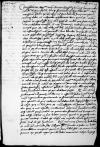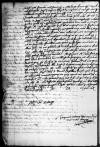Letter #2658
Ioannes DANTISCUS to [Sigmund von HERBERSTEIN]Heilsberg (Lidzbark), 1543-08-17
English register:
Dantiscus received Herberstein’s letter sent from Vienna on June 6. He justifies his being unable to comfort the younger Polish queen, Elizabeth von Habsburg, with conversation: he has left Cracow (June 1). He describes the intrigues of Bona Sforza, the elder queen of Poland aimed at hindering his communication with Queen Elizabeth. As Herberstein wished, he has written to Queen Elizabeth. He has also reminded Sigismund I, the elder king of Poland, in a letter about the conversation concerning Queen Elizabeth that he had with him in private before he left. He describes King Sigismund I’s fatherly kindness towards Elizabeth.
Dantiscus says that Herberstein’s resentment over the ungratefulness of Queen Bona (for services rendered in elevating her to the royal status) is shared by many, and that it is dangerous to write about it. That is also why he is not replying to some other issues raised in Herberstein’s letter.
Dantiscus mentions that Herberstein visited him with Niklas II zu Salm when he was lying ill in Cracow. He informs him that he has recovered his health. He reminds Herberstein that he was to give his excuses to King Ferdinand I: that because of illness he had been unable to deal with the matters entrusted to him in the letter delivered by Herberstein, and that he had failed to reply to it. He asks that Herberstein commend him to Ferdinand I’s attention and express his gratitude for previous favors. He encloses a copy of news received from Gdańsk, which he recently sent to Queen Bona. He asks Herberstein to write to him about current events and to send his reply through Seweryn Boner, to whom he is entrusting the present letter.
Manuscript sources:
Prints:
| ||||||
Text & apparatus & commentary Plain text Text & commentary Text & apparatus Excerpts concerning Dantiscus' travels
Clarissime ac Magnifice Domine, amice carissime plurimumque honorande. Salutem diuturnissimam omniumque fortunarum et dignitatum Magnificentiae Vestrae accessionem precor ex animo.
Quae me suis cf.
Dat(ae) or Dat(um)⌈Dat(ae)Dat(ae) or Dat(um)⌉
Magnificentiae Vestrae deditissimus


 ONB, Cod. 13.598, f. 56r
ONB, Cod. 13.598, f. 56r